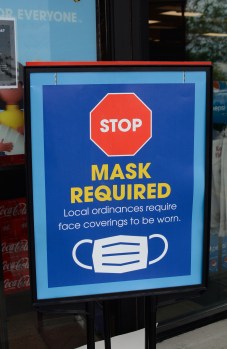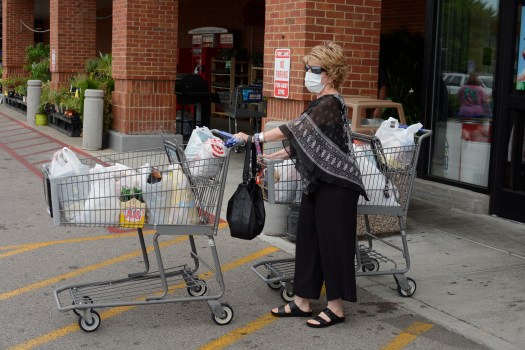Local major retailers get on board with masks
Published 11:13 am Tuesday, July 21, 2020
|
Getting your Trinity Audio player ready...
|
Kroger, the nation’s largest supermarket chain, will require customers to wear masks inside any of their stores, including the one in Winchester, beginning Wednesday.
The Cincinnati-based grocery company announced last week that it would be asking its customers to cover their faces to reduce the spread of the novel coronavirus because of the increase in cases of COVID-19, a sometimes deadly respiratory disease caused by the virus.
Kroger, the second largest retailer in the U.S., joins the largest, Walmart, which implemented a similar requirement Monday.
Rural King’s requirement was effective Friday.
Those big box chains, which all have stores in Winchester, join others that already had orders in place, including Sam’s Club, Best Buy and Costco. Others are expected to follow suit, including Target on Aug. 1.
Kentucky Gov. Andy Beshear last week issued a statewide order requiring masks be worn in public places, but he was immediately challenged by two circuit court judges and an appellate court judge, who blocked his emergency public health orders. He appealed to the Kentucky Supreme Court, who reversed the lower courts’ orders for now.
Also last week, in Georgia, Gov. Brian Kemp prohibited Atlanta and other cities from issuing local mask orders.
In the absence of consistent government policies regarding face coverings, many businesses have taken it upon themselves to require masks.
A manager at the Winchester Kroger said she was not allowed to talk about the new policy, but directed The Winchester Sun to a media relations employee in Louisville, Erin Grant, who provided the newspaper the following statement:
“To help keep our associates and customers safe, we require all associates to wear a facial covering and we are providing masks to every associate, every shift. We support the Executive Order announced by Governor Beshear, and are making every reasonable effort to encourage compliance. We will enforce the order through door signage and in-store radio as well as the ongoing execution of additional protection measures like floor decals and protective partitions at every check lane to further promote physical distancing.
“We respect and acknowledge that some customers, due to medical reasons, may not be able to wear a mask (small children are exempt). We encourage those customers to consider an alternative option like a face shield or facial covering. If they’re unable to wear a mask or an alternative design, we request that they use our ecommerce services like pickup or delivery. To support all households during the COVID-19 pandemic, our grocery pickup service remains free (generally a $4.95 fee).
“We thank our associates and customers for partnering with us to slow down the spread of COVID-19.”
A manager at the Winchester Walmart told The Sun local managers are not allowed to talk to the media, and the company’s media relations office declined to comment except to say that it was not allowing interviews with local associates.
A manager at Rural King in Winchester said their requirement went into effect Friday.
The National Retail Federation supports companies requiring masks during the pandemic and issued a statement.
“Workers serving customers should not have to make a critical decision as to whether they should risk exposure to infection or lose their jobs because a minority of people refuse to wear masks in order to help stop the spread of the deadly coronavirus,” it said.
Across the nation, coronavirus case numbers and deaths are surging after many businesses that had been closed during the pandemic reopened at the beginning of summer without requiring health and safety measures including social distancing and wearing masks.
In Kentucky, there have been more than 23,000 COVID-19 cases and 670 deaths as of Sunday.
According to a fact check article in USA Today Sunday, there are many misconceptions about businesses having the authority to ask customers about medical exceptions to wearing masks. The Health Insurance Portability and Accountability Act, or HIPAA, which regulates health insurance coverage and the protection of health information, does not prevent retailers from asking about health conditions because it applies only to health insurers and health care providers. Similarly, the Americans with Disabilities Act does not apply.
The Fourth Amendment U.S. Constitution, which protects citizens against unreasonable search and seizure, and the Fifth, which protects them against giving testimony against themselves, apply only to governments, not private businesses.
Private businesses are within their rights in asking people to wear masks on their premises and asking about what health conditions they have that might exempt them from complying.









